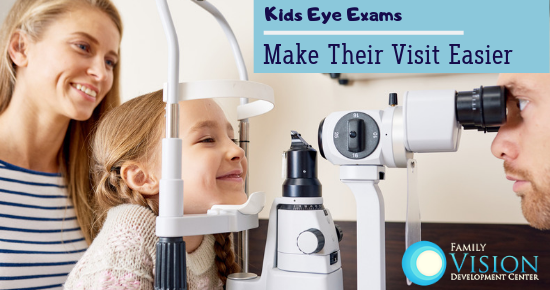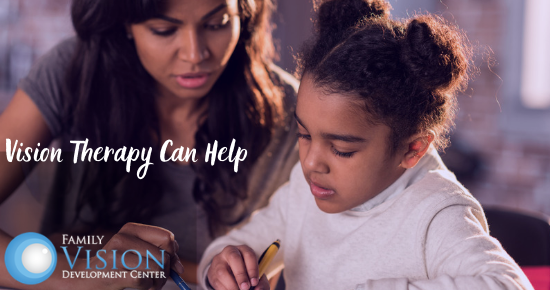A visit to the eye doctor can be a little overwhelming for young patients, especially if it’s the first visit. Even with a friendly, welcoming the staff, small children may feel shy or find vision testing machines and gadgets a little intimidating. Luckily, parents can make an optometrist visit much less daunting by following a few of these suggestions.
Don’t Keep Your Child in Suspense
Whether you’re 3 or 33, new situations are a lot less scary if you know what to expect. Before your child’s optometrist visit, explain the purpose of the visit. (You want to make sure he or she can see well.) Use age-appropriate language to explain the various steps in the eye examination process, which usually include a review of your child’s medical and vision history, a physical examination of the eyes and eyelids, and a visual assessment to determine if your child can see clearly.
During the assessment, your son or daughter will be asked to look at images or letters. Preschoolers may view several large capital Es that face in different directions. They’ll use their hands to indicate which direction the arms of the Es point. If your child knows the letters of the alphabet, he or she will read the traditional Snellen eye chart.
Eye drops may be used to dilate your child’s pupils. Dilation helps the optometrist view the retina, a light-sensing layer of cells that line the back of the eye. Although the drops aren’t painful, they will make your son or daughter’s vision a little blurry. Be sure to mention that the eye doctor will also look in your child’s eyes with a small light during the examination.
Choose the Best Appointment Time
Kids, like all of us, tend to feel a little more energetic at certain times of the day. If you want to make the optometrist visit as pleasant as possible, choose a time when your son or daughter is usually happy and well-rested. Scheduling visits during your child’s usual meal or nap time, immediately after a nap, or at the end of a long day can result in a cranky child who is reluctant to participate in the vision assessment.
Appointments usually last an hour or less, but may take longer if your child’s eyes are dilated or if you want to select eyeglass frames at the end of the visit.
Distract and Engage
The eye doctor will make every effort to see your child at the appointed time, but that doesn’t mean you won’t spend a little time in the waiting room completing paperwork. Prepare for any possible waiting time by bringing a few toys or books from home to keep your little ones occupied.
Offer a Little Reassurance
Some kids hop on the exam chair without prompting, while others aren’t quite as brave. If your young child is nervous or anxious, feel free to hold him or her in your lap during the assessment and examination. Older children may feel more confident if you stay by their sides or sit in a nearby chair during the visit with the optometrist.
When Should You Take a Child to Their First Optometrist Visit?
The American Optometric Association recommends that children visit the optometrist for the first time at 6 – 12 months old, followed by another visit between 3 and 5 years of age, then yearly visits from ages 6 to 18. However – it is important to remember that these are just guidelines. If you notice any issues with your child’s vision, always bring them in. Early detection of vision disorders can make a difference in the effectiveness of treatment, so it is better to be safe. Consult this Parent’s Checklist to look for early signs of vision impairment.
Contact Family Vision Development Center at 630-862-2020 or request an appointment online HERE
Discovering that your child has a vision disorder can be frustrating and overwhelming. You may see them struggling with everyday activities and want to do everything you can to help get the problem corrected. Vision Therapy is a type of visual training (like physical therapy for the eyes and brain) that uses a series of eye exercises to recover normal visual skills. It is very successful for treating many types of vision disorders including amplyopia (lazy eye), crossing eyes, visual tracking issues, focusing or convergence issues, or visual impairment due to a concussion or traumatic injury.
If you are considering Vision Therapy as an option, but are not sure if it is right for your child, read about these parents’ experiences after bringing their kids to Dr. Martin at the Family Vision Development Center in Aurora.
Vision Therapy Can Help With School Struggles
Prior to vision therapy, our son struggled in school. He avoided reading and anything that had to do with writing. Homework was a nightmare and very stressful on the household.
Since he has completed the vision therapy program, school has become easier & he no longer needs reading programs. If it wasn’t for Dr. Martin & his team, I believe things would have progressively got worse.
–Parent of C.C.
Before we started Vision Therapy, getting our daughter to do homework was a nightmare! No first grader should have to sit at the table for nearly an hour writing ten words. She was diagnosed with ADHD because of this lack of focus.
I learned about Vision Therapy and decided to go forward with it. The last few weeks really opened the door for her – she’s reading chapter books! She is blazing thru her math problems & she’s gotten more coordinated physically.
I am SO GLAD we found Dr. Martin while she’s this young – the future is now firmly in her own hands.
–Parent of A.H.
Thanks for all of your work with our son! He’s reading at grade level now and he gets more work done at school so he’s bringing home less homework!
–Parent of R.J.M.
Vision Therapy Can Bring the Joy Back to Reading
Thanks to the whole Family Vision team! My daughter is now an avid reader who is happy to pick up a book! What a change 6 months can make.
–Parent of M.H.
Thank you Family Vision for helping my son. He has been improving on his grades in school because he can now focus better. I think his concentration and being able to retain information has improved as well.
I was most excited when I saw him actually reading a book for fun! That never happened before!
–Parent of B.M.
Vision Therapy Can Improve Quality of Life
What an amazing life changing journey this has been for not only our son, but for us as well!
Before Vision Therapy, he struggled for years in school. Every evening there was homework for hours. His self-confidence was very low.
From the beginning, Dr. Martin & staff had a goal for him that no one else thought he was capable of. We cannot thank you enough for opening so many doors that were shut before.
Love you guys!
–Parent of H.S.
The Family Vision Team Really Cares
We’re very happy for our son’s therapy results! Dr. Martin put together a fantastic team to make it happen & make it a pleasant experience each week.
The environment is very positive – we really appreciate the knowledge, patience, & professionalism that Dr. Martin, Kim, & Nancy have demonstrated. We would recommend the team to anyone who needs a good, efficient, & cost-effective eye therapy.
–Parent of C.Y.
Vision Therapy may not be the right choice for every child, but Dr. Martin will do a comprehensive eye health and vision evaluation before starting any treatments in order to develop the most effective treatment plan for your child. Contact us at 630-862-2020 or request an appointment online to speak with our team and learn more about our advanced Vision Therapy services.



